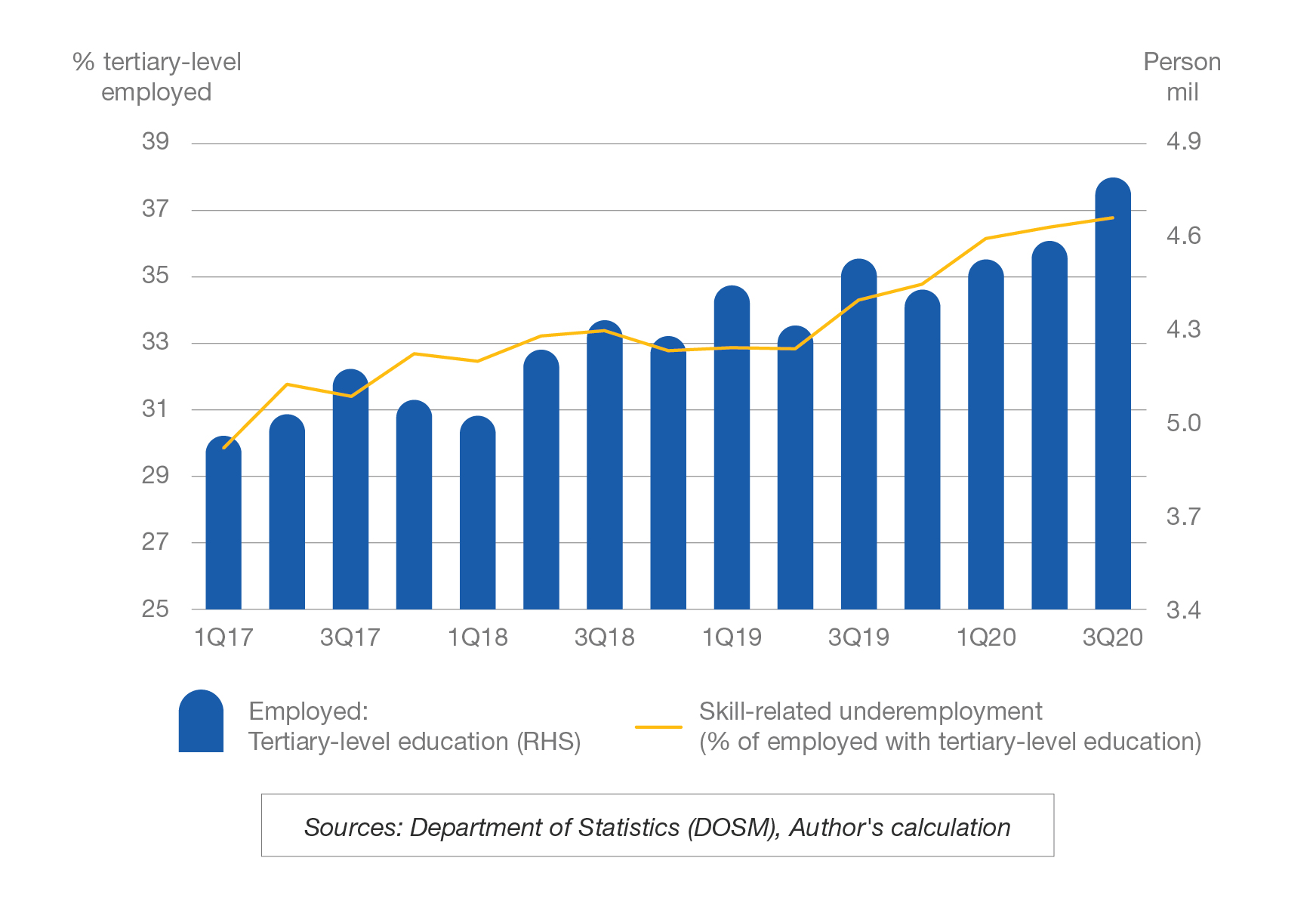
Published by Focus Malaysia, Business Today & Bernama, image from Focus Malaysia.
When talking about underemployment, it is pretty evident that the root of the problem is the mismatch between skills and wages of graduates or in other words, skill-related underemployment.
So, it should start with providing the right education and information to the graduates from the beginning.
It is positive to see that the first step to be aware about the real status of underemployment has been realised with Department of Statistics (DOSM) releasing a more frequent-basis of underemployment figures (quarterly figures).
Based on the official definitions, skill-related underemployment refers to the employed with tertiary-level education but working in semi-skilled or low-skilled occupations.

Despite the increasing employability of graduates, skill-related underemployment appears to be on an increasing trend since the first data available in the first quarter of 2017 (1Q17) up until third quarter of this year (3Q20) – the share has increased from 29.9% to 36.8%.
The latest most notable increase in skill-related underemployment was from 4Q19 to 1Q20 – 1.4 percentage point rise. This could be explained by the disruptions caused by the first phase of movement control order (MCO) beginning March 18 that led to businesses’ cost-cutting measures and graduates opting for alternatives such as underpaid jobs.
During the Budget 2021 tabling, the Government started off well by announcing the reskilling and upskilling programmes which involve the young graduates in Penjana package with an allocation of RM2 bil and then extend it to Budget 2021 with an allocation of RM1 bil.
There will also be implementation of Employment Generation Guarantee Scheme (JanaKerja) next year with an expectation to provide 500,000 new job opportunities.
But implementation is the most crucial part in addressing the issue of underemployment as it needs to be effective for the masses.
Since the reskilling and upskilling programmes will involve cooperation between the government and the private sector, both parties need to ensure that the right and relevant education are provided to the youngsters at institutions about the line of work they should consider given the context of current economic condition.
Not only do graduates find it more competitive to search for jobs due to the lack of working experience, but the constant mismatch of supply and demand of graduates in the industries adds up to the problem.
Thoughts shared by the youth discussants during EMIR Research’s focus group discussion (FGD) which can explain such situation are as follows:
“That’s why for the career path, most students will end up working in completely different industries after they finish studying. For instance, they study and all but, in the end, they do business. Online business and all. Not because graduates don’t want to work in the industry they studied for but there’s no vacancies related to it.”
“Because it happens to be when we want to find jobs, the pandemic happens. And then now, there’s the economic problem. Everyone lost their job. So now, we fresh graduates have to compete with those who have lost their job. They have more experience, and because of that, it’s really hard for us.”
“And actually, for the career path in the 21st century, we don’t work based on the courses we took while studying in universities. We get employed based on our skills.”
So, these are some of the ground examples that should be considered in policy formulation to ensure that they will be beneficial for the rakyat.
Relevant courses to match with high demand from industries should be promoted to the students to mitigate the increasing mismatch in the labour market.
For example, one of the courses to promote is psychology as mental health becomes an emerging issue since the pandemic, hence, more counsellors are needed.
A discussant from the FGD group said: “Since the pandemic, I’ve gotten four offers for psychology-related to COVID-19. So, there are some applications to go to Serdang, KKM, KPT, all of them need counselling. But before this, no one had ever asked for mental health assistance.”
A survey conducted by Kelly Services known as 2020/2021 Malaysia Salary Guide also revealed that the pandemic and people’s increasing reliance on technologies have led to the emerging of “new collar” occupations related to IT, and digital sales and marketing, and rising demand for them.
These facts have to be made known to the students who are just about to get into the universities and searching for the right courses.
Not to forget, this effort needs to be matched with the comprehensive provision of information or data on the changing demand for workforce in each industry.
For every problem that a country faces, there should be a sustainable solution for it. Providing employment opportunities is one matter but it needs to be done fairly for the jobseekers, hence, the need to find solutions to address underemployment.
If it is not addressed, there would be no end to it and worse, it would lead to even more serious economic consequences such as brain drain.
Nur Sofea Hasmira Azahar is Research Analyst at EMIR Research, an independent think tank focused on strategic policy recommendations based on rigorous research.

